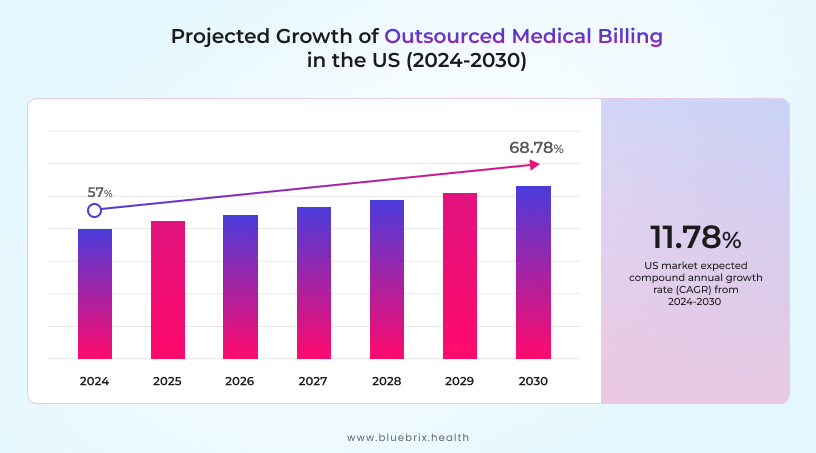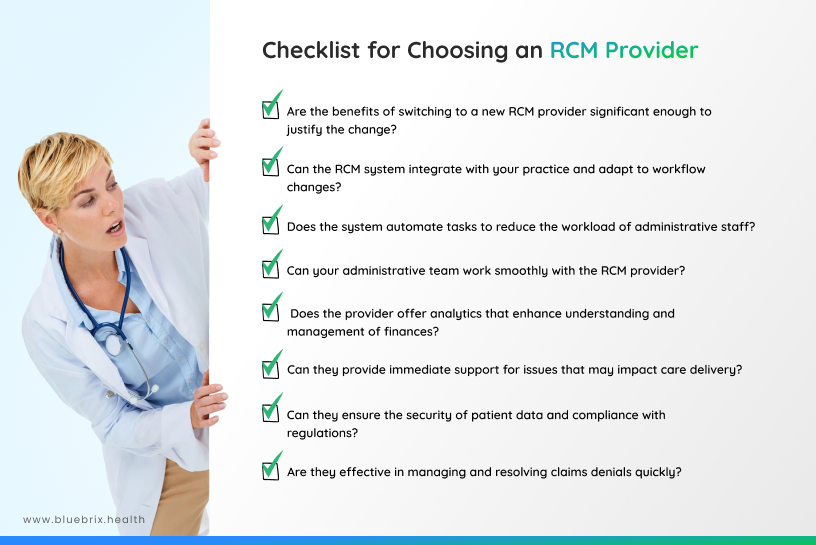
Revenue Cycle Management (RCM) is a financial process that healthcare facilities rely on to manage and optimize revenues from patient services. Using medical billing software, RCM tracks each patient’s journey—from registration and appointment scheduling to the final payment—ensuring accurate identification, collection, and management of all revenues generated through patient care.
This is a necessary and crucial part in the operations of a healthcare organization, because if it doesn’t function optimally, then there would be financial instability; In fact, according to Equifax, “poor billing practices result in doctors in the US losing approximately $125 billion per year, or an average of about $5 million per provider.”
This would cause undue stress for the provider, owing to late/missed reimbursements, and result in cumbersome, potentially confusing and undoubtedly time-consuming tasks for the administrative staff, who would need to handle the complex RCM processes (such as pre-eligibility of benefit verification; or AR & denial management) themselves.
Presently, only 57% of medical billing is outsourced in the United States. However, that is expected to change in the near future, with the market expected to grow at a compound annual growth rate (CAGR) of 11.78% from 2024 to 2030.

Shifting from in-house to outsourced
Let’s understand why this shift from in-house medical billing to outsourced medical billing is taking place:
In-house billing comes with its own persuasive arguments for utilizing the methodology:
• It allows the provider to control their own billing function; this means that it is more accessible, allowing the provider to make changes if necessary for claims.
• There’s a perception that sensitive patient data would be less likely to be corrupted or illegitimately accessed since it is not being shared with third parties, who might have weaker security measures in place.
But, for all those benefits it purports to offer, it does come with its own dependencies as well:
• It can be very taxing financially. Upfront expenses, including labor, costs for technology, hardware, billing software and training, and ongoing expenses for maintaining the billing system, would all burden the provider. It is also important to remember that updates or changes to the billing software, which would be necessary to ensure that it meets current standards and requirements, can be complicated and costly.
• As we briefly mentioned earlier, it would also require a great deal from the administrative staff, who would need ongoing training to keep up to date with the process and the provider would be dependent on them to not make human errors and complete the tasks in a timely manner.
• Hiring a billing specialist can remove that dependency, but they typically demand six-figure salaries, which many small and mid-sized practices can’t afford. For larger practices, multiple billing specialists would be necessary, as a single person could easily become overwhelmed and burnt out. This could lead to errors, undermining the purpose of investing time, effort, and money into building an in-house billing system.
Outsourced billing’s strongest argument in its favor is that it can erase the dependencies of in-house billing:
• It’s less costly. Outsourcing billing would be substantially less financially demanding for practices. Instead of spending six-figures on a billing manager, the provider can handle their entire RCM processes for a fraction of that sum. They would also save on costs that would have been accrued if they had tried to build and maintain their own billing system. It would especially be financially beneficial for larger practices, who would be alleviated from all the same financial trappings, but on a much larger scale.
• It saves time and reduces stress for the administrative staff, who would not have to spend their valuable time learning or training newer team members on how to do billing and accounts receivable.
• It provides peace of mind to the provider (or the CEO/CFO of larger organizations), as they (nor their staff) would have to concern themselves with possible billing errors, denied claims, ensuring that compliance is met, or any other tasks other than providing the best possible care for their patients.
While outsourcing billing does seem like the more attractive choice in comparison to in-house billing, it would be misleading if we were to portray it as flawless. Some of its challengers are:
• It could also require spending money upfront (but significantly less than in-house billing), i.e. for lawyer fees. The handling of contracts and any other legalese between the provider and the billing organization must be conducted by those best suited for the task, so as to ensure that both sides understand and agree on what is expected and required from each other, to avoid any potential issues arising in the future.
• There is a potential for sensitive patient health data to be compromised if the billing organization fails to or is not able to keep their data secure.
How to choose the right RCM provider?
This is a good question. After all, the RCM provider you align with is going to be trusted to handle your financial future (as well as potentially sensitive patient data) and you don’t want to regret that choice. Here are a few questions to keep in mind when evaluating your options:

These are all factors that need to be addressed to ensure that the initial implementation, including the transition, as well as the long-term relationship with the RCM provider will be a rewarding one both financially and logistically.
Outsourcing RCM to blueBriX: Streamlining Revenue Cycle Management to Enhance Patient Care and Billing Efficiency
The blueBriX platform offers an in-house Revenue Cycle Management (RCM) solution, featuring robust features that support healthcare providers and hospitals in optimizing billing, accounts receivable management, and claims processing. Here’s an overview of the key features offered by blueBriX RCM:
In-house RCM Software
blueBriX has proprietary RCM software that serves as the robust technological backbone for our RCM team. This in-house solution enables customization, better control, and seamless support across all RCM operations, including comprehensive patient information management, efficient scheduling, and secure credit card payment processing. The software also integrates real-time eligibility verification and patient billing functions, ensuring streamlined and accurate revenue cycle processes.
Process Analysis
blueBriX begins by evaluating the existing RCM process of each hospital or healthcare provider. Depending on the analysis, it recommends internal changes that should be made to optimize their workflow. Likewise, the blueBriX software is also customized to adapt to the specific operational requirements of the organization thus providing a customized solution for their processes.
Customizable Workflows
With the ability to customize workflows, blueBriX empowers healthcare providers to align RCM processing with their unique requirements. This type of flexibility ensures that the platform integrates seamlessly with the workflow of any hospital, thus improving efficiency and reducing the errors.
Integration with Clearinghouses
The platform can be integrated with different vendors and clearinghouses to enable claim processing and tie-ins of insurance. This type of integration helps in reducing delays and improves the billing cycle efficiency.
Advanced Rules Engine
blueBriX provides an advanced rules engine that helps providers in leveraging existing rules and creating customized rules pertaining to their unique practice. This feature helps in the decision-making process automation and reduces the manual intervention in billing operations.
Data Management and Analytics
The platform provides robust data management as well as analytics capabilities that give insights into financial performance. Hospitals can use these insights for optimizing billing practices, identifying trends and improving revenue collection.
Pre-built Digital Health Features
blueBriX offers pre-built digital health features supporting a wide range of healthcare services, which can enhance the RCM process by ensuring that all services are captured and billed accurately.
Cloud Infrastructure
The cloud-based infrastructure of blueBriX makes RCM processes scalable, enabling it to handle the demands of large healthcare providers. It provides secure data storage along with accessibility, which is important for managing sensitive financial information.
Backend and Frontend Service Management
Comprehensive service management capabilities ensure that both the backend processes as well as frontend interactions are efficiently managed which leads to a smoother billing experience for patients and providers alike.
Automation
When you outsource RCM services to blueBriX, you also leverage the advanced automation features that enhance financial outcomes and operational efficiency. Providers can benefit from real-time eligibility verification to ensure accuracy before service delivery. Centralized billing and claims management reduces administrative load and accelerates cash flow. blueBriX streamlines denial management with automated workflows to minimize claim rejections. Our comprehensive financial management and electronic remittance capabilities enable secure, timely payment processing, improving the revenue cycle. With outstanding AR management, blueBriX maximizes recovery efforts, ensuring that your practice’s financial health remains optimized.
Outsourcing medical billing to blueBriX can transform your revenue cycle management with efficiency, accuracy, and cutting-edge technology. By partnering with blueBriX, you gain access to industry expertise that ensures streamlined billing processes, faster claim submissions, and minimized errors, leading to improved cash flow and greater financial stability. Our customizable solutions are designed to handle the complexities of medical billing, so you can focus on delivering exceptional patient care while we handle the rest.
Take control of your practice’s financial health—experience reduced billing costs, faster claims processing, and higher revenue with expert RCM outsourcing. Ready to streamline your billing process and boost profitability? Contact us today to discover how blueBriX can work for you!
Cited Links
https://www.techtarget.com/searchhealthit/definition/revenue-cycle-management-RCM#:~:text=Revenue%20cycle%20management%20(RCM)%20is,management%20of%20revenues%20from%20patient
https://www.grandviewresearch.com/industry-analysis/us-medical-billing-outsourcing-market#:~:text=Outsourced%20segment%20dominated%20the%20U.S.,improving%20the%20physician%2Dpatient%20relationship.
https://billflash.com/healthcare-industry-insights/medical-billing-statistics-in-the-healthcare-industry/